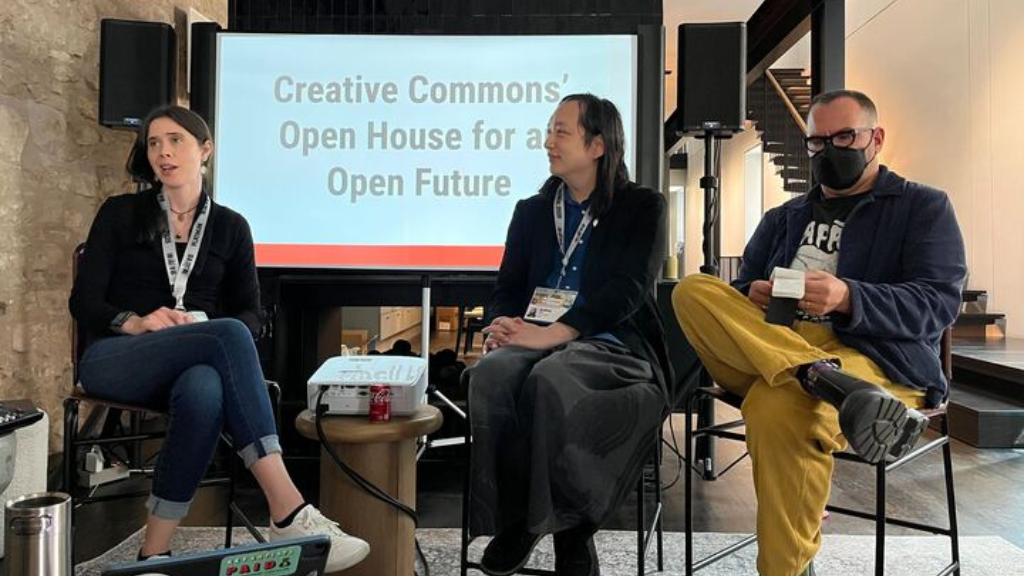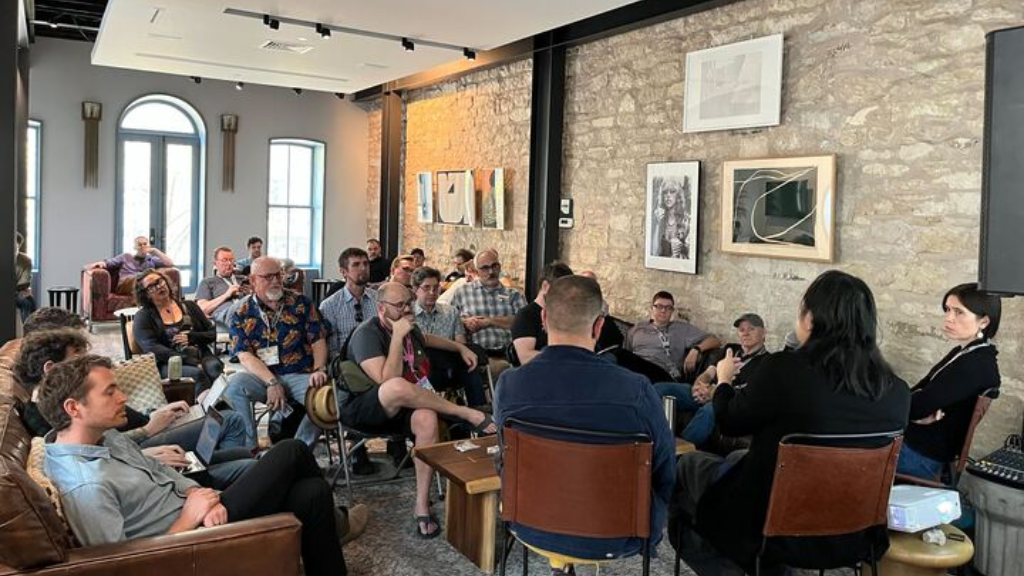Help us protect the commons. Make a tax deductible gift to fund our work. Donate today!

If you’ve been following along on the blog this year, you’ll know that we’ve been thinking a lot about the future of open, particularly in this age of AI. With our 2025-2028 strategy to guide us, we’ve been louder about a renewed call for reciprocity to defend and protect the commons as well as the importance of openness in AI and open licensing to avoid an enclosure of the commons.
Last month, we took some of these conversations on the road and hosted the Open House for an Open Future during SXSW in Austin, TX, as part of a weekend-long Wiki Haus event with our friends at the Wikimedia Foundation.
During the event, we spoke with Audrey Tang and Cory Doctorow about the future of open, especially as we look towards CC’s 25th anniversary in 2026. In this wide-ranging conversation, a number of themes were reflected that capture both where we’ve been over the last 25 years and where we should be focusing for the next 25 years, including:
- The Fight for Technological Self-Determination: Contractual restrictions are increasingly being used to lock down essential technologies, from printer ink to hospital ventilators. The push for openness and economic fairness must go beyond just content-sharing and extend to fighting for the rights of people to repair, modify, and use technology freely.
- Shifting from Resistance to Building Alternatives: The open movement is not just about opposing corporate restrictions but also about creating viable, open alternatives. Initiatives like Gov Zero show that fostering decentralized, user-controlled platforms can help counteract monopolistic digital ecosystems.
- The Power of Exit as a Lever for Change: Simply having the option to leave restrictive platforms can influence corporate behavior. Efforts like Free Our Feeds and Bluesky aim to create credible exit strategies that prevent users from being locked into exploitative digital environments.
- Beyond Copyright: New Frameworks for Openness and Innovation: While Creative Commons began as a response to copyright limitations, the next phase should focus on broader issues like supporting an infrastructure for open sharing, ethical AI development, and open governance models that empower communities rather than just limiting corporate control.
- Reclaiming the Ethos of Open Source and Free Software: The movement must reconnect with its ethical roots, focusing on freedom to create, share, and innovate—not just openness for the sake of efficiency. This includes resisting corporate capture of “openness” and ensuring technological advances serve public interest rather than private profit.
Since the proliferation of mainstream AI, we’ve been analyzing the limitations of copyright (and, by extension, the CC licenses since they are built atop copyright law) as the right lens to think about guardrails for AI training. This means we need new tools and approaches in this age of AI that complement open licensing, while also advancing the AI ecosystem toward the public interest. Preference signals are based on the idea that creators and dataset holders should be active participants in deciding how and/or if their content is used for AI training. Our friends at Bluesky, for example, have recently put forth a proposal on User Intents for Data Reuse, which is well worth a read to conceptualize how a preference signals approach could be considered on a social media platform. We’ve also been actively participating in the IETF’s AI Preferences Working Group, since submitting a position paper on the subject mid-2024 .

As CC gets closer to launching a protocol based on prosocial preference signals—a simple pact between those stewarding the data and those reusing it for generative AI training—we had the opportunity during SXSW to chat with some great thought leaders about this very topic. Our panelists were Aubra Anthony, Senior Fellow, Technology and International Affairs Program at Carnegie Endowment for International Peace; Zachary J. McDowell, Phd, Assistant Professor, Department of Communication, University of Illinois at Chicago; Lane Becker, President, Wikimedia LLC at Wikimedia Foundation, and our very own Anna Tumadóttir, CEO, Creative Commons to explore sharing in the age of AI. A few key takeaways from this conversation included:
- Balancing Norms and Legal Frameworks: There is a growing interest in developing normative approaches and civil structures that go beyond traditional legal frameworks to ensure equitable use and transparency.
- Navigating AI Traffic and Commercial Use: Wikimedia is adapting to the influx of AI-driven bot traffic and exploring how to differentiate between commercial and non-commercial use. The idea of treating commercial traffic differently and finding ways to fundraise off bot traffic is becoming more prominent, raising important questions about sustainability in an open knowledge ecosystem. From CC’s perspective, we’ve found that as our open infrastructures mature they become increasingly taken for granted, a notion that is not conducive to a sustainable open ecosystem.
- Openness in the Age of AI: There is growing reticence around openness, with creators becoming more cautious about sharing content due to the rise of generative AI (note, this is exactly what our preference signals framework is meant to address, so stay tuned!). We should emphasize the need for open initiatives to adapt to the broader social and economic context, balancing openness with creators’ concerns about protection and sustainability.
- Making Participation Easy and Understandable: To encourage widespread participation in open knowledge systems and for preference signal adoption, tools will need to be simple and intuitive. Whether through collective benefit models or platform cooperativism, ease of use and clarity are essential to engaging the broader public in contributing to open initiatives.
Did you know that many social justice and public good organizations are unable to participate in influential and culture-making events like SXSW due to a lack of funding? CC is a nonprofit organization and all of our activities must be cost-recovery. We’d like to sincerely thank our event sponsor, the John S. and James L. Knight Foundation for making this event and these conversations possible. If you would like to contribute to our work, consider joining the Open Infrastructure Circle which will help to fund a framework that makes reciprocity actionable when shared knowledge is used to train generative AI.
Posted 09 April 2025